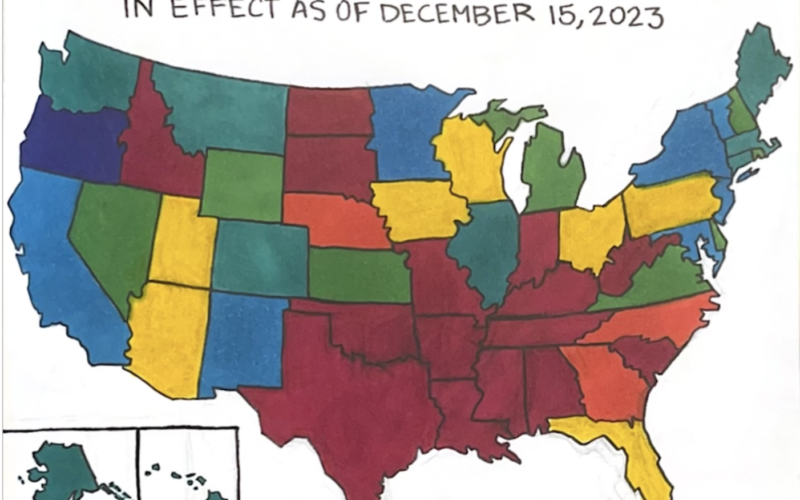College Decisions in a Post-Roe Country
Art provided by Juliette Robertson ‘25 and data for map from Guttmacher Institute
News Analysis by Veronica Hatch
In the June before Zamira F.’s junior year of high school, Roe v. Wade was overturned in the landmark Dobbs decision. As many states moved against women’s reproductive rights and schools’ rights to educate students on topics like gender and sexuality, abortion rights became a catalyst in her college process.
“I never thought the location of my education could have that kind of impact on the rest of my life,” explained Zamira, now a senior.
As she considered schools like the University of Texas at Austin, her mother discouraged her from applying to schools in the South, which Zamira agreed to, as she considered the possible struggle to find community in a place with a much more conservative atmosphere.
In a post-Roe, polarized nation, politics and policy plague the geographical aspect of college choice for many prospective students. Selecting a college is turning into a political referendum for an increasing majority.
According to survey data published by the Lumina Foundation and Gallup, state legislation can have a significant influence on where prospective students enroll or even just apply, particularly when it comes to contentious matters like reproductive rights.
“I felt really weird about everything,” Zamira said, “because my twin brother applied to schools in more conservative states, but I was really discouraged from doing it.”
However, even though survey responses are overwhelmingly in favor of a more liberal abortion policy, there is a gap indicated between initial preferences about where a student might apply and their final decision. While abortion-specific rights do seem to be an important factor for prospective students to consider, it is just one of a slew of concerns around the politics of a state and the impact on academic freedom.
“I knew that if I attended a school in a state like Florida,” Zamira said, “I would really hate it because of the hostility towards queer people like me. It sounded really scary.”
The Art & Science Group released a report last year which found that 1 in 4 college applicants said they completely ruled out certain colleges “solely due to the politics, policies, or legal situation in the state.” Additionally, 76% of U.S. students say that a state’s “divisive concepts” law — like those in Florida and Texas restricting public institutions’ ability to teach content on gender, sexuality and race — would play a role in their decision to attend a college there.
“But I also know that there is a class intersection,” said Zamira. “It would have been fine for me to go to a school somewhere that has really harsh abortion laws because if, for any reason I needed one, I could fly home.”
While the Grace student population differs from national averages in facets such as having a higher percent of economically privileged and left-wing political views in a blue state, a sample survey of Grace students aligns with apparent national opinion among prospective students.
National surveys indicate that abortion rights play a role in the college decisions of 70% of prospective students in the United States, with 80% looking at colleges in states with less restrictive access to reproductive care. In alignment with those statistics, a sample survey of Grace students showed that 81.8% agreed that a state’s laws around abortion access affected the states in which they even considered applying to colleges.
It is in colleges’ best interest to find a way to legally protect the rights and resources that their students value, regardless of where they are located. Actually, it is what they owe to their students. In certain states, it may prove easier said than done. For example, in states where abortion is illegal, institutions could be violating the law if they provide even emergency contraceptives like Plan B.
While political and health factors might not carry the same weight as cost and academic reputation, safety is becoming a bigger consideration. Data suggest that a college’s decision to offer reproductive health services could make a significant difference in attracting applicants and securing commitments.
Veronica Hatch ‘25, the author, is a staff writer for The Grace Gazette.

